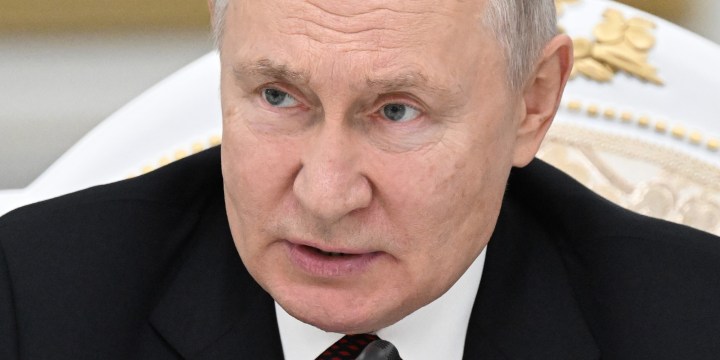UKRAINE UPDATE: 16 OCTOBER 2023
Special forces target Russian power station; Putin says Kyiv’s counteroffensive has ‘failed completely’

Ukraine’s special forces targeted the Krasnaya Yaruga electrical power station in Russia’s Belgorod region with drones, Interfax reported, citing the SBU. The substation is used to power Russian military facilities. There’s been no comment from Russian authorities.
President Vladimir Putin, who’s expected to travel to China early this week, said Russian forces had recently improved their positions across the front lines in Ukraine’s east and northeast, including around Zaporizhzhia, Avdiivka, and Kupyansk. Putin said in a state TV interview that Kremlin troops were employing a tactic he called “active defence”, and were aware that Ukraine was preparing fresh attacks. Kyiv’s months-long counteroffensive aimed at pushing back Russian forces had “failed completely”, Putin added.
Oleksandr Syrskyi, the commander of Ukraine’s ground forces, said on Saturday that Kremlin forces had intensified their operations in the Kupyansk-Lyman area but that Kyiv’s troops were prepared and were defending. Ukraine repelled 15 attacks around Avdiivka, Tonenke and Pervomaiske in the Donetsk region in the past day.
Latest developments
- US, EU will use summit to align strategies on Russia, China
- The trading tycoon steering Russia’s global oil business
- North Korea delivered arms to Russia for use in Ukraine, says US
- US sanctions over Russian oil cap spook tanker markets
- Switzerland refuses to take sides in ever more divided world
The trading tycoon steering Russia’s global oil business
Igor Sechin, the boss of Russia’s state oil company and longtime associate of Putin, celebrated New Year’s Eve on a yacht anchored off Palm Jumeirah, the man-made Dubai island dotted with oligarch-friendly beachfront villas.
Sechin spent most of 2022 grappling with the impact of the invasion of Ukraine on Russia’s oil exports and finding new customers in the wake of sanctions. His most important guest that night was one of the men who helped him do it: oil trader Murtaza Lakhani, according to four people with direct knowledge of the matter.
A veteran of crude oil deals from Baghdad to Caracas, the Karachi native made a name for himself navigating some of the most challenging jurisdictions. Now, in alliance with Sechin, he’d helped set up a web of oil traders and shipping firms to steer Russian barrels around the globe amid a nuanced response from the West — sanctions and a price cap intended to restrict revenues alongside prodding from Washington to keep the flow going.
Most of Lakhani’s Russia-related operations take place in countries not implementing the G7’s price cap on exports, designed to block oil sold above $60 from critical Western-provided services such as shipping insurance. Having worked with Rosneft for nearly a decade before the invasion, he was also in a good position to help the state oil giant navigate an increasingly complex sanctions regime.
Although Lakhani’s main trading firm, Mercantile & Maritime Group, has done deals with Rosneft in the past, the network formed in the wake of the war in Ukraine relies on recently created companies, many of them in the United Arab Emirates, according to six people with direct knowledge of the matter and the internal assessment of a leading Western intelligence agency seen by Bloomberg News.
The people said that even if he doesn’t own them on paper, Lakhani was involved in setting up the firms and plays a role directing their activities. Prominent among them are Tejarinaft, Fossil Trading and Amur II, according to the people.
The law firm Schillings, which represents Lakhani, said he has no involvement in any of those companies.
Those firms, which appear in invoice data over the past year as some of the biggest traders of Russian oil, have bought tens of millions of barrels of the country’s crude, loaded them on to ships and sold them to customers in India and China. It’s helped Moscow minimise the impact of sanctions and earned a big windfall for both Rosneft, which pays billions in dividends to the Kremlin, and Lakhani, four of the people said.
Through his lawyers, Lakhani said neither he nor any business in which he has an interest is trading Russian oil or oil products. His companies stopped trading or shipping Russian oil in accordance with all applicable sanctions, his lawyers wrote in a letter.
Rosneft and Sechin didn’t respond to written requests for comment.
“Before the war, Rosneft had links with a number of traders in Europe,” said Agathe Duparc, a Geneva-based researcher at Swiss non-governmental organization Public Eye, who closely follows the commodities industry and spoke in general terms. “These days, it’s mostly smaller firms controlled by a few individual traders working with the Kremlin. They change their names and set up in Dubai, making their deals more opaque than ever before.”
Putin says Russia needs stronger rouble to meet budget needs
Putin said Russia restored capital controls on major exporters because “we need the rouble a little stronger” for the government’s budget needs.
The measure obliging companies to sell foreign currency revenue for the next six months will have an effect on the market, Putin told reporters at a news conference on Friday in Kyrgyzstan, after a CIS summit of leaders of ex-Soviet states. The decision was “the result of a compromise” reached by the central bank, the government and the presidential administration, he said.
“In present conditions, companies prefer to leave part of their revenue abroad and that’s the whole point,” Putin said. “The volume of imports grew and the desire to leave revenues abroad increased” and regulation “will definitely have to be improved somehow,” he said.
The government announcement citing an unpublished presidential decree late on Wednesday requires 43 groups of exporter companies, including Russia’s main oil producers, to sell their earnings from sales abroad on the domestic market for roubles to ensure a supply of foreign exchange.
Under the rules, the authorities will set volumes and other details of the mandatory-sales mechanism, with some companies required to report on their transactions to authorities.
The surprise decision had an immediate impact on the rouble, which had slumped to the psychologically important level of 100 per dollar in recent months, in part as a result of a deterioration in trade and the ballooning cost of funding Russia’s war in Ukraine. The currency strengthened by 2.9% on Thursday, its best day since early January. DM


















 Become an Insider
Become an Insider
As has yours Puti-baby. 😀